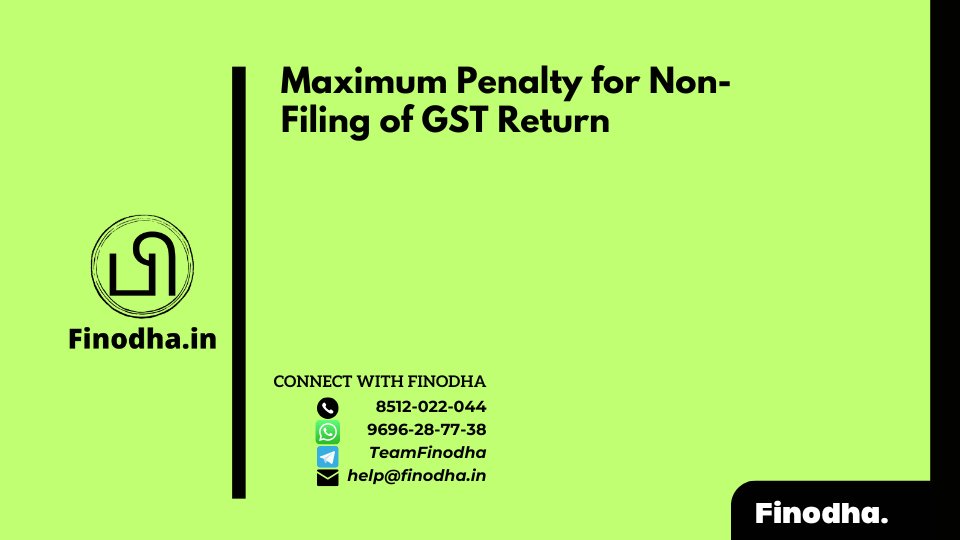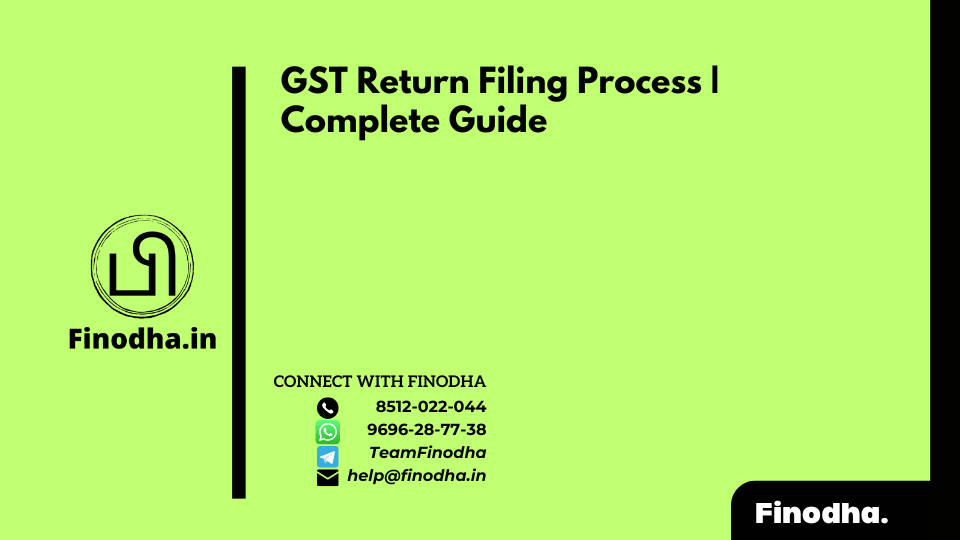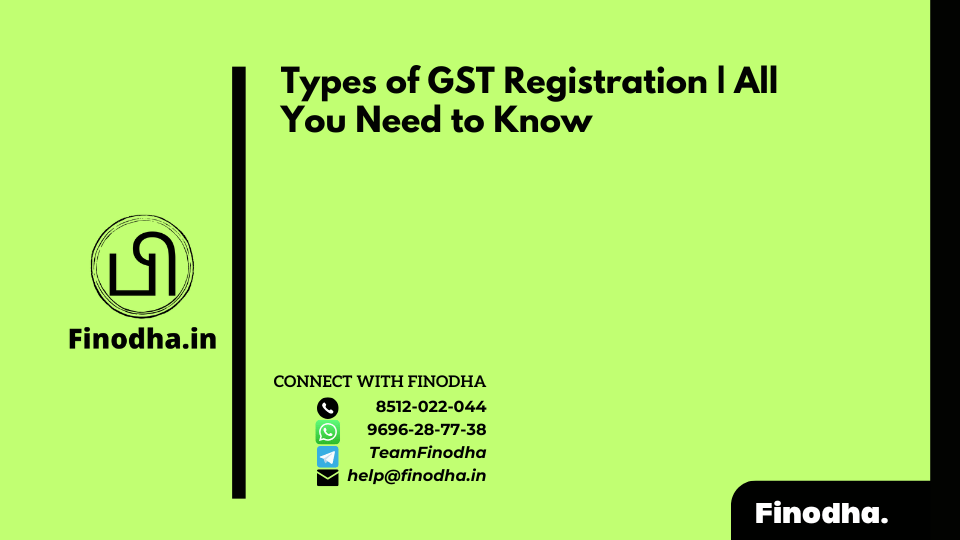Important Keywords: GST Return Filing, GST Registration, GST Cancellation.
Words: 1,502; Read time: 7 minutes.
Table of Contents
Maximum Penalty for Non-Filing of GST Return: Everything You Need to Know
Filing GST returns on time is crucial for every business, as failure to comply can lead to serious consequences. The maximum penalty for non-filing of GST return can significantly affect your business operations and finances, and could even result in the suspension of your GSTIN. In this article, we will break down the GST return non-filing penalty amount, explore the consequences of not filing GST, and provide insights into the penalty for delayed GST submission and the GST filing penalty interest rate. Understanding these penalties will help you avoid hefty fines and penalties and keep your business running smoothly.
By staying compliant, businesses can avoid these financial burdens and ensure smooth operations without disruptions. Whether you are filing your first return or dealing with overdue filings, this guide will walk you through the critical aspects of how to avoid GST penalties and stay in the clear with tax authorities.
Understanding GST Return Filing Penalties
What Constitutes Non-Filing of GST Returns?
Non-filing of GST returns refers to a business’s failure to submit the necessary returns (like GSTR-1 or GSTR-3B) by the due date. This can include both complete non-filing (not submitting any return) and delayed filing (submitting after the due date). Under GST law, businesses are required to file returns regularly to report sales, purchases, and tax liabilities. If you miss a deadline, you risk facing the maximum penalty for non-filing of GST return, along with other severe consequences.
Non-filing can also lead to additional GST return non-compliance charges, especially if the business fails to make payments or fails to report taxes accurately. The maximum penalty for non-filing of GST returns depends on the type of return being filed and the turnover of the business.
Maximum penalty for non-filing of GST return
The GST return non-filing penalty amount varies according to the business’s turnover and the type of return filed. The penalty is calculated on a daily basis. Here’s a breakdown of penalties for different turnover ranges:
| Turnover | Penalty for Normal Return | Penalty for NIL Return |
| Less than ₹1.5 Cr | ₹50 per day | ₹20 per day |
| ₹1.5 Cr to ₹5 Cr | ₹100 per day | ₹40 per day |
| More than ₹5 Cr | ₹200 per day | ₹50 per day |
As shown in the table above, businesses with higher turnover face significantly higher penalties for non-filing of GST returns. Thus, it is essential to understand the importance of timely filing to avoid escalating costs.
Late Fees and Interest for GST Returns
Late Fee for GST Return Filing
In addition to the penalties for non-filing, businesses that file their returns late will incur a late fee for GST return filing. The late fee depends on the type of return and how long it is delayed. For example:
- A business with a turnover of ₹3 Cr that delays its regular return by 10 days will face a late fee of ₹100 per day, totalling ₹1,000.
- For NIL returns, the late fee is ₹40 per day (₹40 × 10 = ₹400).
The maximum late fee for a normal return is ₹5,000, and for NIL returns, it is ₹2,000. It’s crucial for businesses to stay aware of the filing deadlines to avoid unnecessary penalties and GST return non-compliance charges.
Penalty for Delayed GST Submission
Along with late fees, businesses that delay GST payments face a penalty for delayed GST submission. GST law stipulates an 18% annual interest rate on the overdue GST amount, calculated on a daily basis. This means that the longer you delay payments, the more interest will accrue on the outstanding amount. This penalty can add up quickly, causing businesses to pay far more than the original tax due.
Additionally, businesses that claim excess input tax credits (ITC) can face extra penalties for misreporting or over-claiming tax credits. These additional penalties add to the maximum penalty for non-filing of GST returns, making it essential to file accurate returns on time.
Consequences of Not Filing GST Returns
Blocking of GST Features
The consequences of not filing GST returns are severe and far-reaching. After six months of continuous non-filing, the tax authorities may suspend your GSTIN. This means your business will not be able to file future returns, including GSTR-1 and GSTR-3B. Without the ability to file returns, your business could face disruptions, leading to a temporary halt in operations. Additionally, the suspension of your GSTIN means that your input tax credit (ITC) claims will be blocked, causing a rise in your tax liabilities.
Recovery Actions by Authorities
The authorities take non-filing very seriously. If your business continues to ignore filing deadlines, they may initiate recovery actions under Section 79 of the GST Act. This includes issuing notices, reminders, and even proceeding with the seizure of goods or property to recover the due taxes. Such actions further increase the financial burden on businesses already struggling with late fees and penalties, making it even harder to recover from non-compliance.
Best Practices for Compliance
To avoid the maximum penalty for non-filing of GST returns, businesses should follow these best practices:
- Timely Filing: File returns on time to avoid both late fees and penalties.
- Use Online Tools: Leverage online filing tools and automated systems to ensure timely and accurate returns.
- Track Deadlines: Keep track of deadlines for monthly (GSTR-3B), quarterly (GSTR-1), and annual filings (GSTR-9).
- Accurate Records: Maintain accurate records to avoid errors that could delay filing or lead to additional penalties.
By staying on top of your filings, you can avoid hefty penalties, GST compliance fines, and the risk of suspension.
Benefits of Professional Assistance
To minimize the risk of non-compliance and how to avoid GST penalties, businesses should consider using professional services like Finodha. With affordable GST registration and filing services, Finodha helps businesses stay compliant by ensuring that all returns are filed on time. Additionally, Finodha provides real-time updates, quick support, and dedicated relationship managers to address any GST-related concerns.
Call to Action: Why Choose Finodha for GST Compliance?
With Finodha, you can file your GST returns seamlessly and affordably—just ₹125 per month for return filing and ₹798 for GST registration. Finodha provides quick support, real-time updates, and dedicated relationship managers to help you stay ahead in compliance.
CTA: Stay ahead in compliance with Finodha! Contact us today for seamless GST return filing and registration.
FAQs
Q1. What is the maximum late fee for NIL returns?
The maximum late fee for NIL returns is ₹2,000, regardless of how long the return is delayed.
Q2. How is the maximum penalty for non-filing of GST return calculated?
The penalty depends on the turnover of your business and the type of return (normal or NIL). For instance, businesses with turnover between ₹1.5 Cr to ₹5 Cr incur ₹100 per day for normal returns.
Q3. How can I calculate GST interest on delayed payments?
The interest is calculated at 18% per annum, compounded daily on the overdue amount, starting from the due date of the payment.
Q4. What happens if I don’t file my GST returns for six months?
If you don’t file your GST returns for six months, your GSTIN will be suspended, preventing you from filing future returns and claiming ITC.
Q5. What are the consequences of not filing GST returns for an extended period?
The authorities may initiate recovery proceedings, including notices and seizures of goods or property to recover unpaid taxes.
Q6. Is the penalty for delayed GST submission the same for everyone?
No, the penalty varies based on the type of return (normal or NIL) and the business’s turnover.
Q7. How can businesses avoid the maximum penalty for non-filing of GST returns?
By filing returns on time, using professional filing services, and ensuring accurate reporting of taxes, businesses can avoid penalties.
Q8. Can GST compliance fines be waived?
GST compliance fines may not be waived, but businesses can appeal in certain cases if they have valid reasons for non-filing or delayed submission.
More Information: https://taxinformation.cbic.gov.in/
Read more interesting articles:



